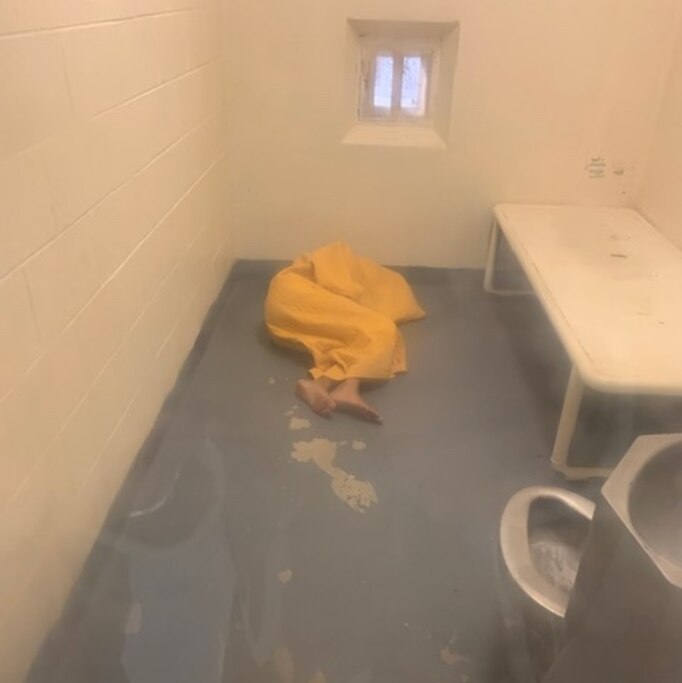In a corner of Baltimore’s main pretrial detention facility, those with severe mental illness wait, often for months, to be transferred to a state-run psychiatric hospital for evaluation or treatment.
At the Baltimore Central Booking and Intake Center, these detainees are typically kept in the inpatient mental health unit, a segment of the aging facility that has become known for its “extremely harsh” living conditions, according to attorneys for the ACLU’s National Prison Project, which tours parts of Baltimore’s sprawling pretrial jail complex regularly as part of a decades-old health care lawsuit.
During a tour of the main jail’s mental health unit in December, ACLU attorney Corene Kendrick saw a notebook with handwritten logs detailing how much time each person incarcerated there was spending outside their cells — or why they weren’t.
“In a lot of ways, it confirmed what incarcerated people tell us, which is that they might be offered a shower, if they’re lucky, like twice a week,” Kendrick said. “They’re just not getting out.”
The logs also painted a different picture than other records produced for the lawsuit by Centurion Health, the jail’s mental health provider. For example, a Centurion-provided record would describe a detainee as refusing to leave their cells, but the handwritten logs showed that they were actually not allowed to leave due to behavioral issues, Kendrick said.
Now, Kendrick and her colleagues are filing motions in court asking the judge to sanction the state for destroying those handwritten logs despite their legal team requesting, verbally and in writing, for the corrections department to preserve them.
The state of Maryland, which is being represented by a private law firm, Butler Snow LLP, has asked the judge for more time to respond to the ACLU’s arguments about evidence destruction amid a backlog of issues yet to be decided, according to court filings. The judge asked Butler Snow to provide its response this week.
The Maryland Office of the Attorney General and the Maryland Department of Public Safety and Correctional Services, which runs the city jails, declined to comment on the case. Centurion did not respond to a request for comment.
In other filings, the state has argued that it increased the amount of time people incarcerated in the mental health unit were allowed out of its cells last year and that the mental health monitor noted “significant improvements” in the conditions of confinement there, including out-of-cell time, after his most recent tour in April 2024.
But the ACLU says the conditions in the mental health unit remain dire, and that it is entitled to more detailed records that would quantify time outside of cells across the mental health unit.
Many of the people incarcerated in the mental health unit are awaiting transfers to psychiatric facilities run by the Maryland Department of Health for evaluation or treatment.
But those facilities are overwhelmed, leading to record wait times for admissions despite a state-mandated 10-day deadline for the transfers to be completed
In Baltimore County, a judge recently sanctioned the health department more than $600,000 for repeatedly failing to fix the issue. Baltimore County’s district public defender lauded jail officials there for doing their best to provide treatment despite difficult circumstances.
But the city’s pretrial complex has for decades been run by the state corrections department, which is subject to federal oversight due to Duvall v Moore — a lawsuit that stretches back to the mid-1970s.
The class action suit has been settled, reopened and settled again, most recently in 2016, but then it was reopened once again to enforce the terms of that settlement. The state is currently arguing through private attorneys that it should be allowed to exit the settlement’s terms.
Despite a staff goal to facilitate several hours of out-of-cell time in both the morning and afternoon for mental health and other programming, or return “back to pre-pandemic levels,” some detainees in the city jail report leaving their cells only two or three hours a week, the ACLU wrote in recent court filings.

Attorneys for the ACLU wrote in a letter to the court in late 2022 that those held in the mental health unit endure the “harshest and most deprived conditions we have ever encountered in any prison or jail in the United States, including in death row and ‘supermax’ units.”
The attorneys described detainees kept in isolation without writing or reading materials, including religious texts. They also reported that detainees were often not allowed clothes, a practice used by correctional facilities to reduce the possibility of suicide, “even when they have stabilized and present no active risk of harm to themselves.”
The ACLU listed a trans woman who was housed in the mental health unit due to fear for her safety and a man housed there because he was recovering from a head injury as two examples of people who were wrongfully prohibited from wearing clothes.
Fighting for access
After noticing logbooks in the jail during the December tour, Kendrick of the ACLU said she notified the representative from the state attorney general’s office verbally that they’d like copies of the records and asked the state to preserve future records.
In total, Kendrick identified various records that shed light on the question of mental health treatment she felt the ACLU was entitled to: separate paper records kept by custody staff and nurses detailing out-of-cell time and daily census forms recording the movement of all detainees in the mental health unit.
The state acknowledged the request, and the ACLU received its first and only copies of the logbooks in January, Kendrick said, adding that the records returned were “incomplete.”
Kendrick said the ACLU received two sets of logs: one handwritten log kept by the custody officers and computer-generated logs kept by Centurion.
The handwritten logs showed discrepancies that the ACLU laid out in court filings: Some detainees who were either not allowed out of their cells or not offered an opportunity to leave them were recorded on the Centurion-generated logs as receiving two hours out of their cells for activities such as “dinner/lunch, movie, and recreation.” Other records showed detainees receiving 50 minutes of out-of-cell time, but who were recorded by Centurion as receiving two hours, the filing said.
And the ACLU said in its filings that one detainee who was listed on a facility count sheet as having not been offered out-of-cell time due to their behavior was listed in the Centurion tracker as having a “seven-minute Treatment Team encounter with mental health staff.”
“It means either mental health providers are going up to a cell front and yelling through a little hole, which is obviously not mental health treatment, to have a non-confidential encounter in front of everyone,” Kendrick said in an interview. “Sometimes it will show a visit by the treatment team, but those encounters are vanishingly rare and extremely short.”
Kendrick added: “In no way could you say that’s at all adequate or appropriate mental health treatment,” which is one of the core requirements of the consent decree stemming from the ACLU lawsuit.
Months later, in April, the ACLU updated its request for the handwritten notes for January through March, and on a monthly basis thereafter, as well as other records requests. Five weeks after the request, the state responded with some records, but none of the ones pertaining to the inpatient mental health unit, the ACLU wrote in court filings.
In a letter provided to the court by the ACLU, the state answered the request for records detailing out-of-cell time by arguing they were “not official documents and therefore not preserved for production.”
“Instead, nursing staff document out of cell time for IMHU patients in nursing notes, which DPSCS preserves in the electronic patient health records,” William Lunsford, the Butler Snow attorney representing the state, wrote in response.
Having reached an impasse, the ACLU filed a motion asking the judge overseeing the case to compel the corrections department to turn over the records and sanction it for “spoliation of evidence.”
State prepares for consequential hearing
It’s unclear if the fight over records will be resolved anytime soon.
The state and the ACLU are preparing for an Aug. 20 hearing on the jail lawsuit, with Butler Snow attorneys having recently pivoted from the state’s strategy from recent years of asking for deadline extensions.
Their new argument is that the state is already in compliance with the agreement, which mandates that it provide constitutionally adequate health care and mental health services. Attorneys for the state have accused the lawsuit’s plaintiffs and independent monitors of moving the goalposts on the agreement. Plus, it argues, the agreement expired on July 1.
“Given the expired nature of the settlement agreement, it technically mandates dismissal by the court,” attorneys working for the state argued. “However, even if this court elected not to dismiss this action due to the expiration of the settlement agreement, no basis exists for the continuation of the settlement agreement.”
The attorneys added that “the state firmly believes that the current circumstances at BCBIC and MTC Infirmary far exceeds any interpretation of the minimal level of care passing constitutional muster.”
The fate of the lawsuit will likely be decided by U.S. Judge Matthew J Maddox, a President Joe Biden appointee who recently took over the case, at the Aug. 20 hearing.





Comments
Welcome to The Banner's subscriber-only commenting community. Please review our community guidelines.